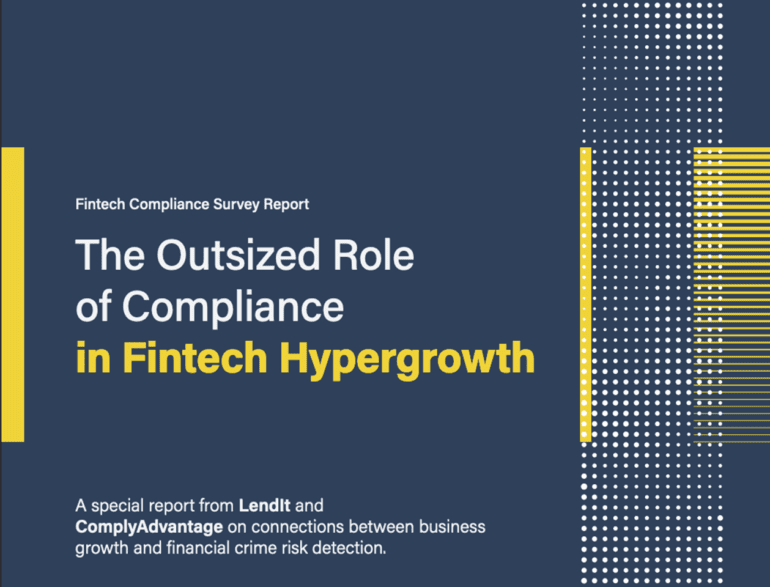Last week, Comply Advantage, in partnership with LendIt, released a research whitepaper exploring connections between business hyper-growth and financial crime risk detection.
Check out the full report here after reading these highlights:
“The most promising fintechs exploit speed and agility. But to ‘move fast and break things’ — and capitalize on the rapid scale this maxim may unlock — they must also reduce front-end risk,” the white paper begins.
“Concerningly, compliance investments in particular lag sexier investments in the platform or end-user experience.”
The how and why
Comply Advantage and LendIt sent a survey to 1,000-plus LendIt subscribers, including domestic and international fintechs and services providers, with 15 questions on risk management, tech, performance, and data collection.
The paper found under-investing in compliance risk has devastating effects:
In early 2021, US financial regulator FINRA levied substantial risk management-related fines against Robinhood. Cryptocurrency platform BitMEX incurred $100 million in AML related penalties. For challenger bank Monzo, the UK’s Financial Conduct Authority (FCA) investigation into financial crime regulation breaches overshadows impressive 100% year-on-year deposit growth.
According to Compliance Week, in 2020, regulators handed out $2.2 billion in AML fines, up from $444 million in 2019. The first six months of 2021 reflected a similar trend, with $994 million in penalties assessed over 17 actions.
Notably, growth requires meaningful financial crime risk data and detection efforts. Therefore, the market survey assessed fintech risk program maturity to understand the risk process profiles of top performers.
“Our goal was simple: Discover how risk management and measurement maturity relate to business growth. We also expected to uncover insights connecting technology, data, and enterprise agility. This report explores our findings on these issues and more.”
Rapid, sustained business expansion
The report found that the highest growth fintechs in the industry had risk solutions in place that support fast growth, with the expectation of a rapidly changing regulatory environment.

“Fintechs need AML solutions that fit their technological approach,” Charles Delingpole, Founder & CEO at Comply Advantage, said. “Functionality like APIs for easy integration, state-of-the-art tooling for AML analysts, and seamless customer onboarding are table-stakes for hyper-growth companies.”
Over Half of “hyper-growth companies” that reported a compound Annual Growth Rate (CAGR) of 40%+ agreed or strongly agreed that their risk solutions address challenges posed by new tech.
Friction-free onboarding for hyper growth
According to leaders surveyed, over 80% of hyper-growth companies complete know-your-customer (KYC) checks in less than 24hours. For companies with a CAGR of 10%or less, this drops to 60%.

“Growth and compliance need to go together, and you can’t always onboard new staff when you onboard new customers,” Valentina Butera, Holvi head of AML and Anti Fraud operations, said.
Market pressure to speed up product and service delivery shows no signs of easing. While once marketed as a differentiator, the survey found that customers today expect speed.
How the big have fallen: Failing to meet regulations
The report points out that even giants like Facebook have failed to react to compliance issues appropriately.
When the Libra digital currency launched, it monopolized headlines, the report reads.
“With an army of world-class engineers and deep-pocketed partners, project success seemed certain. But, then, it derailed,” the study found.
“Corporates including PayPal, Visa, Mastercard, Stripe, eBay, and Mercado Pago withdrew support citing concern about the project’s ability to “meet regulatory expectations and potential exposure to enforcement actions.”
Libra became Diem, Facebook became Meta, and Diem became Novi, and before long, Meta scrapped the plan entirely.
Innovative, automated, and agile risk management is central for projects that want to succeed. But, as the survey demonstrates, hyper-growth fintechs are already seizing advantages of solutions and platforms that help enable success.


